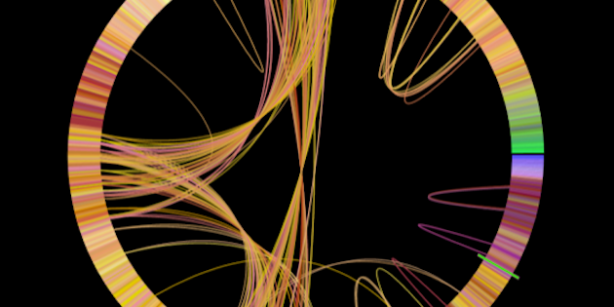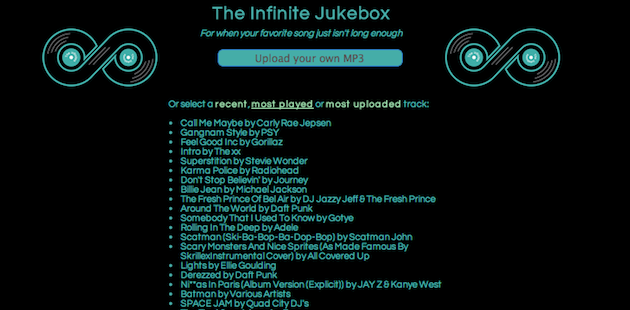 Tech
Tech
TECH: Understanding the Infinite Jukebox
by Matthew Braga
January 24, 2013
There are certain songs that I wish would never end—songs where the beat is too infectious, or the lyrics so well crafted, that I wouldn’t fault my repeat button for disabling itself in protest of overuse.
With The Infinite Jukebox, you really can listen to your favourite song forever, conventional repeat be damned. And it’s scary how well it works.
The Infinite Jukebox is an online app built by a guy named Paul Lamere, who just so happens to be the director of developer platform for The Echo Nest. The Massachusetts-based tech company specializes in something called music intelligence, which is really just a fancy way of saying in-depth audio analysis.
From tempo to timbre, The Echo Nest knows more about your favourite song or band than you could ever imagine. And part of that knowledge is knowing exactly how songs are structured—the individual beats, riffs, hooks and fills that make up some of your favourite tunes. (Another part of that knowledge is knowing how to turn any song into dubstep, thanks to something called The Wub Machine, but we’ll let you Google that one on your own.)

Listen to enough pop music, for example, and you’ll notice that everything sounds the same. Not in terms of style, lyrics, or even instrumentation, of course, but the sequence in which those musical elements are arranged. There’s a familiar—some might even say traditional—verse-chorus structure that repeats multiple times over the course of a song, and these patterns, or repeated segments, are what Lamere’s Infinite Jukebox exploits.
Lamere created Infinite Jukebox as part of Music Hack Day, “an international 24-hour event where programmers, designers, and artists come together to conceptualize, build, and demo the future of music,” most recently held at MIT. But it wasn’t the idea’s first outing – and initially it was only based around one song.
That song, Psy’s “Gangnam Style,” is still perhaps the best example of how Infinite Jukebox works (though you can, of course, still upload a song of your choice, or choose from a list of the most popular or impressive loops). Each song is rendered as what Lamere refers to as a cantogram—a circular visualization where each segment represents a single beat. A swath of lines or arcs connect some of these beats together, creating, quite literally, pathways between similar segments of a song for the Infinite Jukebox to move between.
In short, more lines mean more similarities and a better transition between beats, resulting in a song that is not only different with each listen, but seemingly, seamlessly, infinite.
Of course, “not every song is as self-similar as Psy’s masterpiece,” wrote Lamere in a post on his site. Some require the app to dynamically adjust how hard it searches for similar beats, or pathways to different parts of the song. “This means that the overall musical quality may vary from song to song depending on the amount of self-similarity in the song.”
In other words, a song that has more repeating elements—and “Gangnam Style” has a lot—is easier to loop. It’s for this reason that “Gangnam Style” can sound infinitely awesome (pardon the pun), but “Stairway to Heaven,” which largely eschews an expected or repeating structure, more of a mess.
You could perhaps view this as commentary on the state of popular music – that it lacks the depth or complexity or musical innovation of other genres. After all, if the parts “Gangnam Style” can be so effortlessly re-organized by an app and still retain the song’s original spirit, is the value of composition and arrangement cheapened? And does it make more complex and experimental compositions, such as Yo-Yo Ma, or the aforementioned Zeppelin, musically superior?
Or, less cynically, is this simply an example of how repetition is not only rampant in popular music, but often key to its repeat appeal? There’s a reason, after all, I’ll listen to “Gangnam” forever, but “Stairway” only once at a time.
After twenty blissful minutes of infinite Daft Punk, I’m not sure I even care.
This article originally appeared in the December/January issue of AUX Magazine. Download and subscribe for free in the App Store.
Tags: Tech, News, AUX Magazine, Echo Nest, gangnam style, Infinite Jukebox, psy, technology





